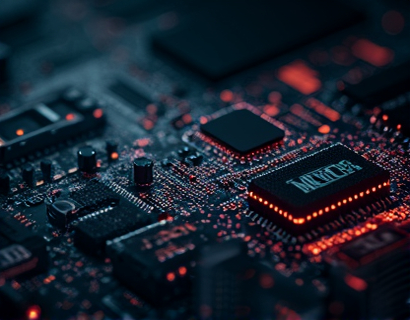DeFi Trading Optimized: Leveraging Advanced Smart Contract AMMs for Enhanced Automation and Liquidity Management
The decentralized finance (DeFi) ecosystem has revolutionized the way we perceive and interact with financial markets. At the core of this transformation are Automated Market Makers (AMMs), which have redefined liquidity provision and trading mechanisms. This article delves into the advanced smart contract AMMs that are reshaping DeFi trading, focusing on how these technologies optimize liquidity management and automate trading strategies. By leveraging these innovations, crypto traders and DeFi enthusiasts can experience a more seamless and efficient market interaction, tailored to the dynamic crypto landscape.
Understanding AMMs in DeFi
AMMs are a cornerstone of DeFi, designed to facilitate trading without traditional order books. Unlike conventional market makers who provide liquidity and quote bid-ask spreads, AMMs use mathematical formulas to determine prices based on the liquidity provided by users. This model eliminates the need for intermediaries, reducing costs and increasing accessibility. The most common AMM model is the constant product market maker, where the product of the liquidity provider's tokens remains constant, ensuring price stability and liquidity efficiency.
Smart contracts play a pivotal role in AMMs, executing trades and managing liquidity pools automatically. These self-executing contracts on a blockchain ensure transparency, security, and trustless interactions. The use of smart contracts in AMMs not only automates the trading process but also enhances the reliability and speed of transactions, making DeFi trading more appealing to a broader audience.
Advanced Smart Contract AMMs: A Step Forward
The evolution of AMMs has led to the development of advanced smart contract AMMs that offer enhanced features and capabilities. These next-generation AMMs incorporate sophisticated algorithms and protocols to optimize liquidity management and trading automation. Some of the key advancements include:
- Improved Liquidity Provision Models: Advanced AMMs introduce dynamic fee structures and incentive mechanisms that encourage more liquidity providers to participate. These models adjust fees based on market conditions, ensuring optimal liquidity availability during high-volatility periods.
- Enhanced Order Routing and Execution: Utilizing advanced routing algorithms, these AMMs can distribute orders across multiple liquidity pools to find the best execution prices. This feature minimizes slippage and improves trade efficiency, crucial for high-frequency traders and large institutional investors.
- Cross-Chain Compatibility: With the rise of cross-chain interoperability, advanced AMMs can operate across multiple blockchain networks. This capability allows for greater liquidity and accessibility, breaking down silos and fostering a more interconnected DeFi ecosystem.
- Risk Management Tools: Advanced AMMs incorporate sophisticated risk management features, such as automatic stop-loss and take-profit orders, to help traders manage their exposure and maximize returns. These tools are powered by smart contracts, ensuring real-time monitoring and execution.
Optimizing Liquidity Management
One of the primary challenges in DeFi trading is managing liquidity effectively. Advanced smart contract AMMs address this issue through several innovative approaches:
Firstly, dynamic liquidity provision allows users to adjust their liquidity contributions based on real-time market conditions. This flexibility ensures that liquidity pools remain robust even during periods of high trading volume or market stress. Secondly, liquidity aggregation pools combine multiple liquidity sources into a single pool, enhancing depth and reducing fragmentation. This aggregation is managed through smart contracts that optimize the distribution of liquidity across pools, ensuring efficient market operations.
Moreover, advanced AMMs implement liquidity incentives that reward providers for their contributions. These incentives can be in the form of token rewards, reduced transaction fees, or access to exclusive features. By aligning the interests of liquidity providers with the health of the ecosystem, these incentives foster a more robust and resilient DeFi market.
Automated Trading Strategies
Automation is a key differentiator of advanced AMMs in DeFi trading. By leveraging smart contracts, these platforms can execute complex trading strategies with minimal human intervention. Some of the automated trading strategies enabled by advanced AMMs include:
1. Arbitrage Strategies: Advanced AMMs can detect price discrepancies across different markets and automatically execute trades to exploit these differences. This capability ensures that traders can capitalize on arbitrage opportunities seamlessly and efficiently.
2. Hedge Strategies: Traders can set up automated hedging positions to mitigate risks associated with price fluctuations. Smart contracts monitor market conditions and adjust hedging positions in real-time, providing a proactive approach to risk management.
3. Algorithmic Trading: Advanced AMMs support the deployment of custom trading algorithms that can execute trades based on predefined criteria. These algorithms can analyze market data, identify trends, and make trading decisions autonomously, enhancing the trading experience for sophisticated users.
Enhancing User Experience
The integration of advanced smart contract AMMs into DeFi platforms significantly enhances the user experience. Here are some ways in which these technologies improve interaction for crypto traders and DeFi enthusiasts:
Firstly, the automation of trading processes reduces the need for constant monitoring and manual intervention. Users can set up trading strategies once and let the smart contracts execute trades on their behalf, freeing up time and reducing cognitive load.
Secondly, the transparency and immutability of blockchain technology ensure that all transactions are recorded and verifiable. This level of transparency builds trust among users and reduces the risk of fraud or manipulation.
Thirdly, the user interfaces of advanced AMMs are designed to be intuitive and user-friendly, making DeFi accessible to a wider audience. These interfaces provide real-time market data, portfolio overviews, and trade history, empowering users to make informed decisions.
Challenges and Considerations
While advanced smart contract AMMs offer numerous benefits, there are also challenges and considerations that users should be aware of:
Firstly, the complexity of smart contracts can pose security risks. Bugs or vulnerabilities in the code can lead to significant losses. It is crucial for users to choose platforms with well-audited and secure smart contracts.
Secondly, the decentralized nature of AMMs means that users have full control over their funds, but they also bear the responsibility of securing their private keys. Loss of access to these keys can result in permanent loss of funds.
Lastly, the regulatory landscape for DeFi is still evolving, and users should stay informed about compliance requirements and potential legal implications.
Conclusion
Advanced smart contract AMMs represent a significant leap forward in DeFi trading, offering optimized liquidity management and automated trading strategies. These technologies not only enhance the efficiency and accessibility of DeFi markets but also provide powerful tools for traders to manage risks and maximize returns. As the DeFi ecosystem continues to mature, the role of advanced AMMs will become increasingly pivotal, shaping the future of decentralized finance.











































